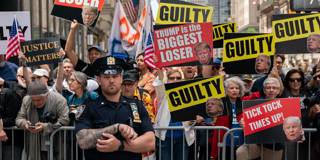Following Donald Trump’s conviction in a Manhattan courtroom, the Wall Street Journal’s editorial board worries that the successful prosecution of a former president will usher in “a new and destabilizing era of American politics.” But that era already began in 2016, and the blame for it lies squarely with Trump himself.
CHICAGO – Now that a Manhattan jury has convicted Donald Trump of falsifying business records in order to cover up a crime – whether it is an election-related or a tax-related crime is not clear – a host of new questions arise. Will Judge Juan Merchan send the former president to jail before the election in November, and, if so, will Trump nonetheless be re-elected and released? If the judge merely fines Trump or puts him on probation, what impact might that have on the outcome? Finally, will Trump get his conviction reversed on appeal? If so, what will that mean if he loses the election only after the reversal?

CHICAGO – Now that a Manhattan jury has convicted Donald Trump of falsifying business records in order to cover up a crime – whether it is an election-related or a tax-related crime is not clear – a host of new questions arise. Will Judge Juan Merchan send the former president to jail before the election in November, and, if so, will Trump nonetheless be re-elected and released? If the judge merely fines Trump or puts him on probation, what impact might that have on the outcome? Finally, will Trump get his conviction reversed on appeal? If so, what will that mean if he loses the election only after the reversal?